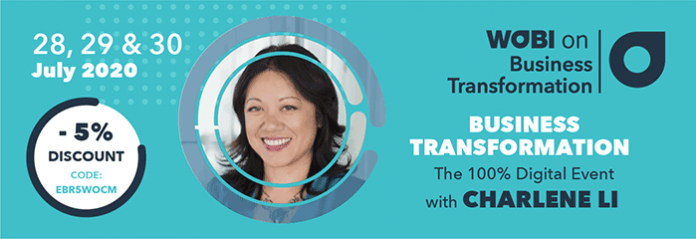The growth in the global digital transformation has never been greater. Even before the COVID-19 crisis erupted, many organisations were struggling to keep pace with technological change. Here, Charlene Li, a highly acclaimed author and a leading expert on digital transformation shares the importance of resilient leadership and disruptive thinking in creating a successful digital future.
Charlene Li, in recent years you have dedicated yourself to accompanying people to see the future from different perspectives to find better opportunities. Tell us what your work is about.
My work focuses on helping leaders thrive with disruption as an expert on digital transformation, leadership, and strategy. My work includes writing books and reports, speaking, consulting, and serving as an advisor and coach.
This is a time of crisis due to the coronavirus. What changes and opportunities do you see for companies and their leaders?
Our lives have been disrupted and won’t return to “normal” for a long time. During turbulent times, needs don’t go away—they shift. And if you miss these shifts, competitors and new entrants will gain a competitive advantage over you. Disruption creates opportunities but only for those who look up and bravely seek them out rather than hunkering down and waiting for the chaos to pass.
How can an organization plan in an environment of uncertainty?
The first step is acknowledging that uncertainty is a certainty and using one of the most powerful tools to understand the situation — scenario planning. It is a process that creates multiple iterations of the future and develops robust strategies for each one. Identify and execute on the “no-regrets” moves. Then set up triggers that notify you that one scenario is unfolding versus the others.
The virus has changed consumer habits. What customer experience models do you identify for post-2020? What will be the most disruptive factors?
It’s obvious that consumers will be much more concerned about cleanliness and hygiene which means building into the customer experience even more communication about what you are doing to address those needs. This can range from having someone designated on-site as the safety manager with a highly visible vest or hat, to offering transparency into how you make your products/services. Trust is in short supply and organizations/brands will have to work extra hard to establish and maintain their credibility.
Organizations change and the characteristics of leaders change as well. How often do we need to revise our leadership models?
The Greek philosopher Epitetus said, “You have two ears and one mouth. Use them in the same proportion.” We must change the way we lead based on what our followers need from us. With COVID-19 and sheltering in place, we needed to change the way we lead almost overnight. The virus has provided one very important lesson – we are more resilient leaders and organizations than we ever thought possible! Disruptive leaders frame their leadership in the context of their followers – they practice the art of Followership as a form of leadership. To that end, they change how they show up as leaders as often as they need to in order to maintain a strong relationship with their followers.
What factors make a disruptive leader and how do you create a disruptive mindset?
Two factors distinguish a disruptive leader. First, an openness to change mindset. Second, leadership behaviors that empower and inspire people. The first sets the direction for the disruption while the second pulls people to the cause and creates a movement that will carry everyone throw the inevitable tough times ahead. The best way to create that disruptive mindset is to focus on the needs of your future customer – if you truly understand them, you won’t be able to resist chasing after them.
What are the skills that the market will need to overcome this crisis and boost the economy?
The biggest one is being able to look beyond the challenges of today and invest in an uncertain future. It’s hard enough during normal times to focus on the future – it feels nearly impossible when we can barely predict what will happen next week. But that is what the most competitive organizations and their leaders will do – they have the cash reserves and the courageous people to take the risks that others will not. And they will benefit from being first to the future.
You talk about how technology impacts leadership. In what way and why it is decisive at the moment?
Leadership is a relationship between those who aspire to lead and those inspired to follow them. Relationships form from interactions and conversations and today, many of those conversations take place on digital and social channels. Leaders may be personally comfortable being digital but not necessarily confident showing up as a leader digitally. Especially now, when we must connect with colleagues even more via digital channels, it’s all-important for leaders to be confident extending their leadership into digital and social channels.
Digital transformation is an important topic for business right now. How do you see the process of digital transformation and at what point does it become about people rather than technology?
We often focus too much on the “digital” and not nearly enough on the “transformation”. This is why so many digital transformation efforts fail. Our research has shown over and over again the importance of leadership and culture in digital transformation – it makes no difference how advanced the technology is if people won’t adopt it and use it to change the way that business is done.
You are one of the speakers at the WOBI on Business Transformation event that will take place at the end of July, why should people attend this event?
People should attend if they want to learn not just how to survive disruption but how to thrive with it. The world needs us to be confident in our ability to bring exponential change to our organizations, communities, and society. There are so many challenges that need to be addressed and things will change only if we show up as disruptive leaders.
Executive Profile
 Charlene Li is an expert on digital transformation, disruptive growth strategies, and a renowned author of five books, including the New York Times bestseller, Open Leadership and the critically acclaimed book, Groundswell. She founded Altimeter Group, an analyst firm that was acquired in 2015 by Prophet and recognised as one of the most creative people in business.
Charlene Li is an expert on digital transformation, disruptive growth strategies, and a renowned author of five books, including the New York Times bestseller, Open Leadership and the critically acclaimed book, Groundswell. She founded Altimeter Group, an analyst firm that was acquired in 2015 by Prophet and recognised as one of the most creative people in business.



























![“Does Everyone Hear Me OK?”: How to Lead Virtual Teams Effectively iStock-1438575049 (1) [Converted]](https://www.europeanbusinessreview.com/wp-content/uploads/2024/11/iStock-1438575049-1-Converted-100x70.jpg)




